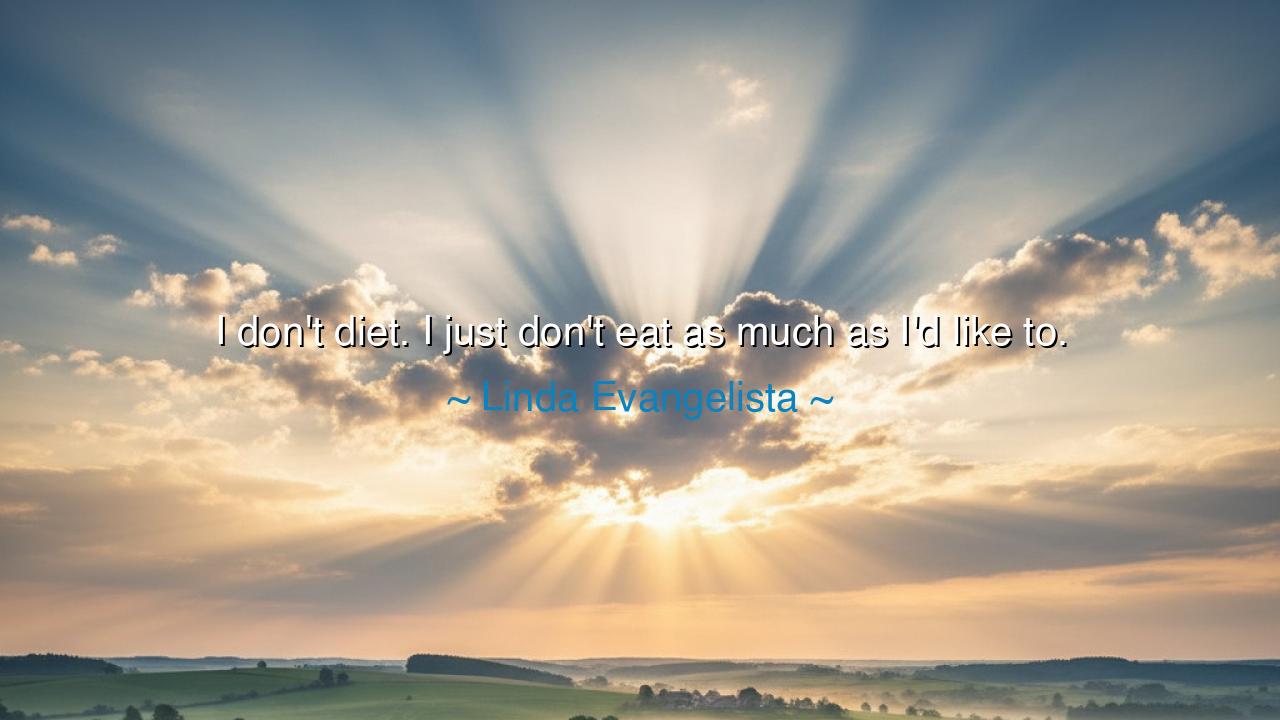
I don't diet. I just don't eat as much as I'd like to.






When Linda Evangelista said, “I don’t diet. I just don’t eat as much as I’d like to,” her words, though spoken with the effortless grace of one long accustomed to the public eye, carry within them a deep and ancient truth — the eternal struggle between desire and discipline. Beneath their simplicity lies wisdom about restraint, about the quiet art of moderation, and about the human longing for balance between indulgence and control. Her confession is not one of vanity, but of self-awareness — a recognition that mastery over the self is rarely achieved through extremes, but through understanding one’s limits and walking carefully between hunger and fulfillment.
In her statement, Evangelista dismantles the illusion of perfection so often associated with her world. She does not claim to possess divine will or deny her human appetites; instead, she admits the truth that all who seek beauty, health, or excellence must face — that sacrifice is woven into the fabric of discipline. The phrase “I just don’t eat as much as I’d like to” speaks of quiet endurance, of small daily choices that shape a life. It is not a sermon of denial, but of measured living, a modern echo of an ancient principle: temperance, the virtue praised by philosophers and poets alike, as the foundation of wisdom and grace.
The ancients knew well that desire is both the flame of life and the seed of ruin. The Stoic philosopher Seneca warned that “it is not the man who has too little, but the man who craves more, who is poor.” To eat less than one desires, to hold back when the senses beckon, is not to live in deprivation, but in command. Evangelista’s words reflect this same spirit — a form of discipline without denial, where restraint becomes not punishment but freedom. For she knows that to surrender completely to appetite is to lose one’s sovereignty; to control it, even gently, is to remain master of one’s fate.
History too offers its lessons. The Roman general Cincinnatus, called from his humble farm to save Rome, was known for his moderation. After victory, he returned to his plow rather than seek power. His greatness lay not in conquest, but in self-restraint — the same principle that animates Evangelista’s simple phrase. In a world that glorifies excess, both figures remind us that strength lies not in what we consume, but in what we choose to resist. Their power, quiet but unshakable, comes from the same source: the ability to say no when the world whispers more.
There is also humility in Evangelista’s tone, a kind of quiet rebellion against the culture of constant dieting, deprivation, and self-criticism. She reframes the conversation from obsession to awareness. To her, it is not about following rigid rules or external systems, but about listening to the body, about knowing when enough is enough. The ancients would have called this sophrosyne — the harmony between body, mind, and spirit that keeps one balanced amidst desire. It is the art of the middle path, the golden mean that Aristotle spoke of — neither gluttony nor starvation, but the measured act of conscious choice.
Her words also hint at the bittersweet nature of all human discipline. There is an honesty in her admission that she sometimes wants more — more food, more pleasure, more freedom — but chooses otherwise. This is the essence of all noble struggle: the recognition that the things we want most often require giving up the things we want now. It is the same truth that guided the Buddha, who, in his early years, renounced both luxury and extreme asceticism to find the Middle Way — a path of moderation and mindfulness that leads to peace. Evangelista’s balance mirrors that wisdom: she neither indulges nor rejects, but walks the narrow path between both.
The lesson, then, is one of quiet mastery. Discipline is not denial; it is direction. To restrain oneself is not to reject joy, but to protect it from becoming excess. To eat less than one desires, to stop before one is full, to hold back a word or a pleasure when the heart clamors — these are not acts of deprivation, but of strength. They remind us that the soul grows not through indulgence, but through awareness.
So, my listener, remember this ancient counsel: do not seek to silence your desires — learn instead to govern them with grace. Like Linda Evangelista, understand that the secret is not in rigid rules, but in mindful restraint. Take what you need, savor it deeply, and stop before it owns you. For those who master the art of “just enough” will find that their hunger — whether for food, for success, or for life itself — becomes not a torment, but a teacher. And in that balance lies the quiet, enduring strength that has guided the wise through every age.






AAdministratorAdministrator
Welcome, honored guests. Please leave a comment, we will respond soon